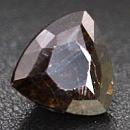|
|
||||||||||||||||
|
||||||||||||||||
|
||||||
|
|
|
|
Graftonite
|
|
| | |
| Discovered in 1900; IMA status: Valid (pre-IMA; Grandfathered) | ||
|
| ||
|
Chemistry |
|
|
| |
|
(Fe2+,Mn2+,Ca)3(PO4)2 | |
|
|
Iron Manganese Phosphate |
|
Molecular Weight: |
351.93 gm |
|
Composition: |
Calcium |
3.42 % |
Ca |
4.78 % |
CaO |
|
|
Manganese |
14.05 % |
Mn |
18.14 % |
MnO |
|
|
Iron |
28.56 % |
Fe |
36.75 % |
FeO |
|
|
Phosphorus |
17.60 % |
P |
40.33 % |
P2O5 |
|
|
Oxygen |
36.37 % |
O |
|
|
|
|
|
100.00 % |
|
100.00 % |
= TOTAL OXIDE |
|
|
|
||||
|
Classification |
|
|
| |
|
Phosphates | |
|
7/A.04-20 | |
|
|
8 : PHOSPHATES, ARSENATES, VANADATES |
|
Related to: |
None |
|
Varieties: |
None |
|
Synonyms: |
Repossite |
|
|
|
|
Crystal Data |
|
|
|
|
|
Very rare crude crystals, stout prismatic; usually massive, cleavable, in laminated intergrowths with Triphylite, to 0.5 m. |
|
|
None |
|
|
|
|
|
Physical Properties |
|
|
|
|
|
Good on {010}, Fair on {100} |
|
|
Irregular/Uneven to Subconchoidal |
|
|
Brittle |
|
|
5.0 |
|
|
3.67 - 3.79 (g/cm3) |
|
|
None |
|
|
Not Radioactive |
|
|
Other: |
Readily soluble in acids. |
|
|
|
|
Optical Properties |
|
|
|
|
|
Salmon-pink to reddish brown, dark brown when altered; nearly colorless in transmitted light. |
|
|
Transparent to Translucent |
|
|
Vitreous towards Resinous |
|
|
1.695 - 1.736 Biaxial ( + ) |
|
|
0.024 - 0.027 |
|
|
Relatively weak; r > v or r < v |
|
|
Faint; X = Y = colorless; Z = pink |
|
|
|
|
|
Occurances |
|
|
|
|
|
Geological Setting: |
A primary mineral or exsolution product in complex granite pegmatites. |
|
Common Associations: |
Triphylite, Lithiophilite, Sarcopside, Ferrisicklerite, Heterosite, Arrojadite, Fairfieldite, Barbosalite, Huréaulite, Almandine, Zircon, Albite, Muscovite, Biotite |
|
Common Impurities: |
None |
|
Type Locality: |
Melvin Mountain, Grafton, Grafton Co., New Hampshire, USA |
|
Year Discovered: |
1900 |
|
View mineral photos: | |
|
|
|
|
More Information |
|
|
|
|
|
| |
|
|
|
|
Distribution:
In the USA, on Melvin Mountain (Type Locality), about
eight km west of Grafton, at the Palermo #1 and Rice
mines, near North Groton, Grafton County, at the Parker
Mountain quarry, Center Strafford, Strafford County,
and many other places in New Hampshire; from the Waisenen
quarry, Greenwood, Oxford County, Maine; in the Bull
Moose mine, five km southeast of Custer, Custer County,
and at the Nickel Plate mine, 1.5 km south of Keystone,
Pennington County, South Dakota. From near São Luiz
do Paraitinga, São Paulo, and the Énio pegmatite mine,
northeast of Galiléia, Minas Gerais, Brazil. At the
Ranquel and Cacique Canchuleta mines, San Luis, Argentina.
From Sidi Bou Othmane, Morocco. In the Valle della Madonna,
Brissago, Tessin, Switzerland. At Olgiasca, Lake Como,
Lombardy, Italy. From Hagendorf, Bavaria, Germany. In
the Kondakov district, eastern Siberia, Russia. Additional
localities continue to be recognized. |
|
|
We
have not photographed our Graftonite gems yet. Please
check back soon. |
